College of Science, Engineering & Technology
Unisa donation will improve science education at Lebogang Secondary School
On 26 October 2022, the engaged scholarship project team of the Institute for Nanotechnology and Water Sustainability (iNanoWS) at Unisa’s College of Science, Engineering and Technology (CSET) travelled to Lebogang Secondary School in Welkom to make a significant donation of a human skeleton and 10 multi-meter devices used for monitoring water quality.
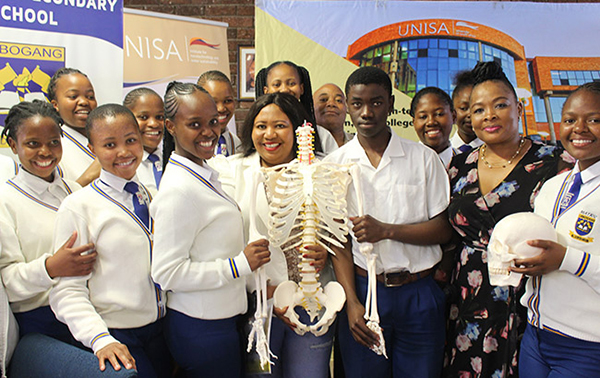
Pictured here with the donated skeleton are Nqobokazi Chabangu (Life Sciences teacher at Lebogang Secondary School) (centre), Linky Sefo (Lebogang Secondary School Principal) (second from right) and Grade 12 learners
The donations were made to aid the improvement of the quality of science education, particularly for Life Sciences and Physical Sciences subjects at the school.
The relationship between Lebogang Secondary School and iNanoWS started in 2021, when one of the former learners from Lebogang Secondary School and a master’s graduate from iNanoWS, Mookgo Mofokeng, noted that the school had challenges in terms of their science equipment and laboratories. She then advised the school to contact iNanoWS and explain the kind of support they wish to acquire.
Human anatomy made easy
Earlier this month, the iNanoWS team, together with Prof Paul Westerhoff (one of the advisory board members of iNanoWS), visited Lebogang Secondary School and were taken through their science laboratories. During this visit, one of the science teachers at the school, Thabo Khumalo, indicated that amongst the many challenges experienced in their science education delivery to learners, is the difficulty in explaining the human anatomy concept in a practical and visual manner to learners, and that the availability of a human skeleton would assist them in this regard. "Well, we have brought a human skeleton which, when assembled, is 1.8 metres high," said Prof Thabo Nkambule, head of iNanoWS, in his speech as he was doing the handover to the school.
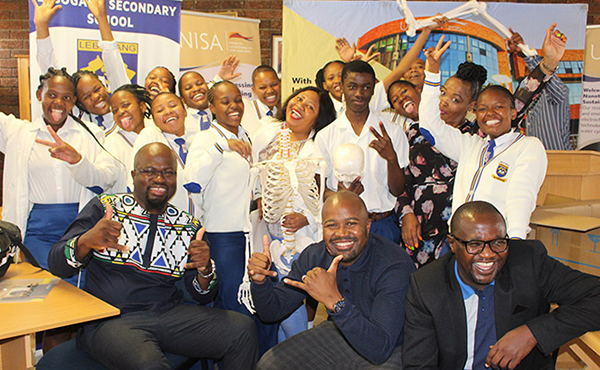
Front, from left: Prof Thabo Nkambule (Head of iNanoWS), Vuyani Mankayi (former learner at Lebogang Secondary School) and Prof Lawrence Madikizela (iNanoWS)
Back: Linky Sefo (Lebogang Secondary School Principal) (second from right) and Nqobokazi Chabangu (Life Sciences teacher at Lebogang Secondary School) (centre)
"We are grateful to Prof Paul Westerhoff, who purchased the skeleton and shipped it all the way from the United States of America," he added. "We are also donating to the school 10 hand-held conductivity meters which are useful in monitoring water quality parameters."
Practical solar water treatment project to reduce costs
In addition to the donations, the iNanoWS team will also be instituting a project at the school to develop and customise a water treatment system to reduce its water bill.
The water system will be capable of providing water that is fit for drinking and domestic use, and also for agricultural purposes. "We want the school to take ownership of the water system, and both learners and teachers to be involved in the maintenance and running of the system and understanding water treatment," said Nkambule.
Instead of using electricity to produce water, the system will make use of solar energy to drive the production of clean water and will also feature a merry-go-round type of facility that learners will swing on, which will assist in pumping dirty water up into the purifying panels, leading to the production of clean water.
The conductivity meters donated to the school will then be useful in the continuous monitoring of the quality of water produced by the water treatment system. "Eventually," continued Nkambule, "we want to get to a point where the water system operation can be automated and controlled remotely from anywhere. The school can simply log into a water app which we have also designed and see how the system is working."
Accompanying the iNanoWS delegation was Vuyani Mankayi, a previous learner at Lebogang Secondary School, who shared some words of motivation with the Grade 12 learners. "To achieve things in life, you need to move with the people that you relate to," said Mankayi. "In 2002, I was one of the highest achievers at this school, and today I am one of the few welding technologists in the world. There are only 300 of them in South Africa, and I’m number 174."
In closing, Lebogang Secondary School Principal, Linky Sefo, expressed her gratitude to the iNanoWS team and to her staff members, emphasising to science teachers in the school the importance of utilising the donated human skeleton as they prepare the learners for the upcoming final examinations.
"The delivery of the human skeleton today will assist us in ensuring that Life Sciences teaching improves," said Sefo. "I'm hopeful that most learners will benefit from this donation and that the science results will improve. I foresee growth in the sciences department of the school and more of our teachers being capacitated."
Sefo said that she believes that the partnership with Unisa was formed by God and that Lebogang Secondary School is going to produce more scientists. "I am deeply humbled by this gesture, and I bow to Unisa," she concluded.
* By Dr Nozipho N Gumbi, Acting Communication and Marketing Specialist, College of Science, Engineering and Technology
Publish date: 2022-10-28 00:00:00.0

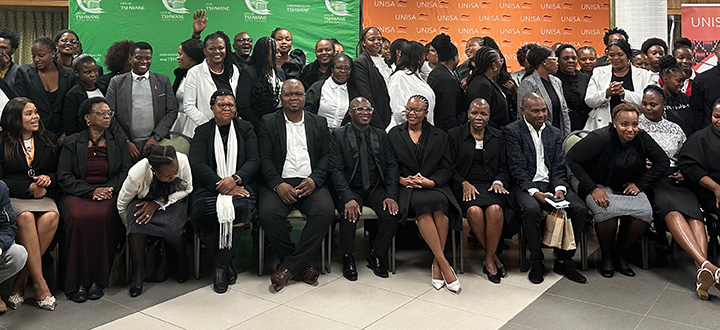 Unisa academics join hands to celebrate World Social Work Day
Unisa academics join hands to celebrate World Social Work Day
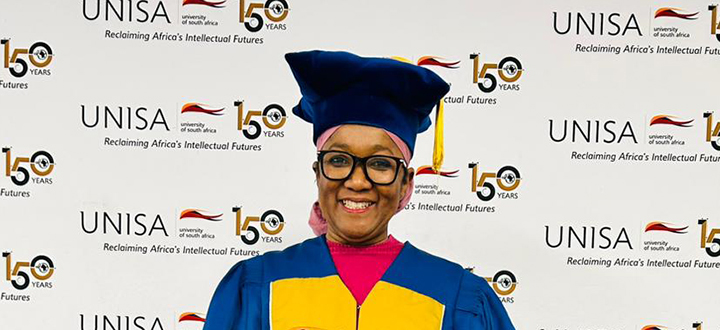 Unisa community engagement initiative targets school underperformance
Unisa community engagement initiative targets school underperformance
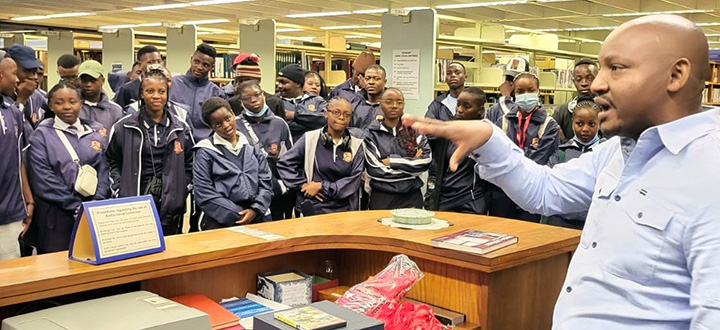 Library tour introduces learners to the wonderful world of Unisa
Library tour introduces learners to the wonderful world of Unisa
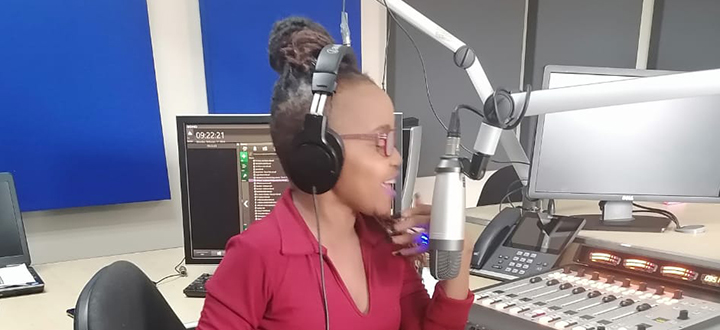 Unisa Radio volunteer wins prestigious community journalism award
Unisa Radio volunteer wins prestigious community journalism award
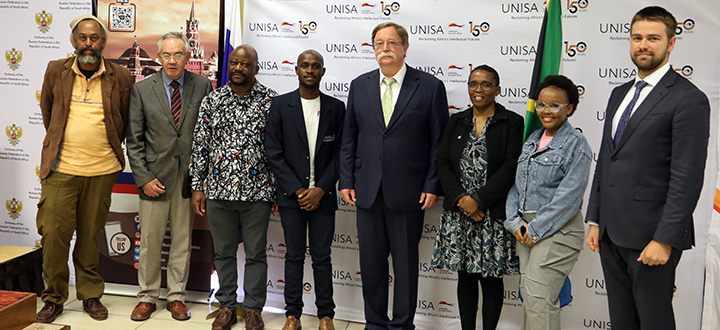 Unisa's student leadership engage with Russian ambassador
Unisa's student leadership engage with Russian ambassador